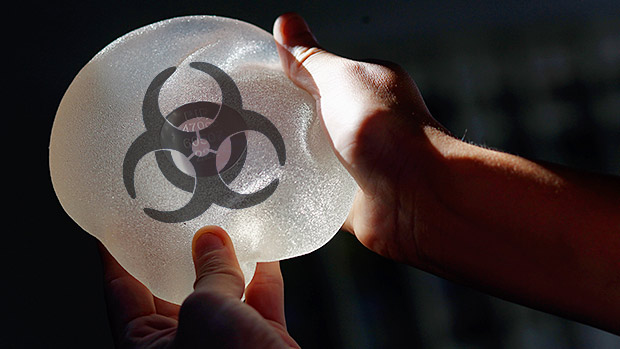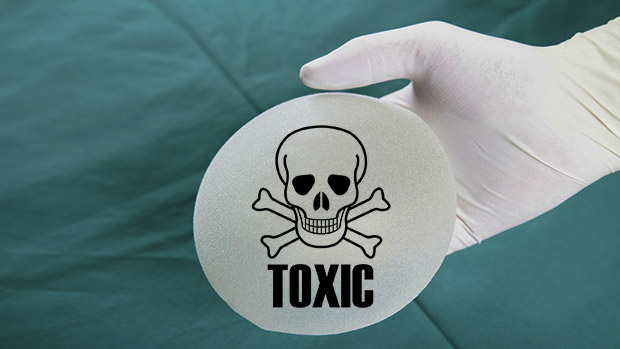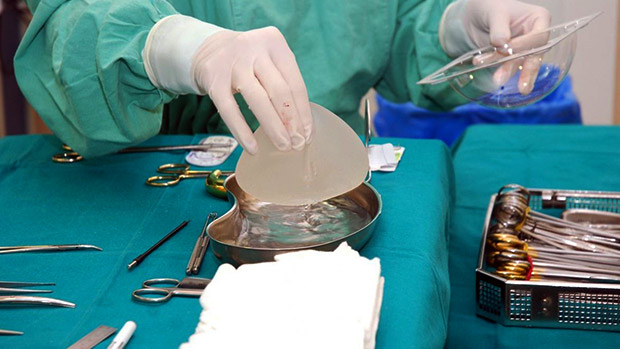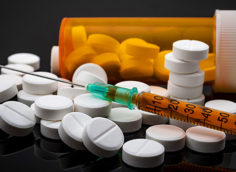BII: The Hidden Affliction
Most women never suspect their breast implants. They go to their doctors, get a diagnosis, and take their meds like well-behaved patients. But when their ever-growing list of symptoms can't be medicated away, they start doing their own research. They have no other choice.
And that's how women come across breast implant illness (BII). They seek answers online because they're in pain, and unfortunately, their doctors only have enough knowledge to put a Band-Aid over their symptoms instead of eliminating the source of those symptoms.
I had my implants for 6 years. The last 4 were marred with painful, life-altering flare-ups. And then I found out about breast implant illness from other women online, and discovered that more often than not, when their implants were removed, most of their symptoms went away... if not all of them.
So Why Don't Doctors Acknowledge It?
The symptoms are so widespread that doctors can't really call it an illness. For instance, the flu is known to cause a sore throat, fever, chills, and body aches. But BII can't easily be categorized as a singular condition since its reported effects can hit every system in the body and mimic other illnesses.
So think of it like a reaction. If a body reacts negatively to breast implants, it can do so in a variety of ways, and not all women with BII will have the same exact set of symptoms.
When you have BII, one of the things it may do is lower your immunity, making you prone to all sorts of illness, but it's unlikely that the medical community will ever call it an "illness" of its own. I'll still use the term BII here because that's how it's most widely known among the women who have struggled with their implants and are searching for answers.

So What Are The Symptoms?
If your body is reacting to your breast implants, it may manifest in such random ways that your implants never even cross your mind as a potential culprit. I was lucky enough to have burning pain directly in my breasts, which tipped me off, but thousands of other women experience the repercussions differently.
Many have reported autoimmune symptoms and have even been diagnosed with Lyme disease, fibromyalgia, Raynaud's syndrome, scleroderma, Hashimoto's thyroiditis, leaky gut, mixed connective tissue disease (MCTD), rheumatoid arthritis and others.
But that's not all. Even if they don't receive an official diagnoses many women report symptoms like these:
| Fatigue | Anxiety |
| Night sweats | Lowered immunity |
| Food sensitivities | Light sensitivity |
| Migraines | Blurry vision |
| Burning or pain in muscles | Joint pain |
| Breast pain | Hair loss |
| Cystic acne | Rashes |
| Itching around the breasts | Candida |
| Dental problems | Neuropathy |
| Chronic digestive problems | Bladder issues |
These are just a fraction of the most obvious symptoms. Others are more subtle and creep up over time. Many women say they've experienced infertility, early onset menopause, low thyroid function, estrogen dominance, and extremely low testosterone. (So much for implants making you feel sexy if you don't feel like having sex.)
Many of us have experienced digestive issues, like SIBO (small intestine bacterial overgrowth) and gut permeability (leaky gut). These come with their own set of side effects and lead to food sensitivities and deficiencies in vitamins and minerals.
And the complications from BII will spread into other areas of life. My training was interrupted for months at a time due to chronic burning pain that actually got worse with exercise. And I was almost always struggling with digestion or wondering when I'd be sick again. When I did work out hard, it felt like playing Russian roulette. I knew it was only a matter of time before I'd get an infection or a full blown flare-up.
But other women have had it worse. Some endured years of pain and sickness, causing them to lose precious time with their children. Others actually lost their jobs because of BII. They simply could no longer perform the tasks required for employment.
And quite a few shared what happened when their spouses protested their implant removal. Certain "men" couldn't bear the sight of their wives in better health with a flatter chest, so they served them divorce papers.
Too Much of A Reach?
That's what most people in the medical community think. I know it's hard to wrap your mind around BII at first.
But years ago, if a woman had burning pain in her body and nobody could see what caused it, doctors would say it's all in her head. Fibromyalgia simply wasn't a known condition yet. So she'd be on her own. But now that doctors have more information on it, they treat this condition... as if it's common knowledge they've always had.
How many times are we going to go through this routine? How many times will there be an instance where people have a condition and doctors don't believe them until there's a prescription for it?
It's like Western medicine is the last to know things about health. Information has to trickle down to doctors before they can actually help people. And they seldom look for the actual source of the condition in order to eliminate it. No, they'll just find a drug to make the symptoms more tolerable. That's what happens with women who have BII... until they discover the rest of us who've had our implants removed.
Everything In The Body Affects Everything Else
If you're doubting BII, you're thinking something like this:
"How could implants cause such a wide variety of problems? Your teeth are nowhere near your implants. Your eyesight has nothing to do with your boobs. Your digestive system doesn't communicate with your tits. That's not how the body works."
But the thing is, no system in the human body works independently. They affect one another in some way. The digestive system depends on the circulatory system depends on the pulmonary system depends on the endocrine system... they're intricately connected. So if one is struggling to do its job, it will affect all others – this includes your liver, kidneys, adrenals, intestines, heart, lungs, brain, and neurons throughout the body. EVERYTHING.
And what's even scarier is that widespread systemic problems will eventually affect your thinking. Numerous women struggling with the symptoms caused by BII have been depressed and considered suicide. There were more than a handful of times when I knew it would be a relief to not live anymore. But if you say anything like this to most mainstream doctors, they will put you on Xanax because you're a depressed person, and all your pain and health complications are caused by your mind.
Isn't THIS a bigger reach? What kind of witchcraft would we have to be doing for our minds to cause all of our health problems?
The truth is, the body's reaction to implants causes a domino effect, and since the women suffering from BII can't just conduct research on anyone other than themselves, they're left with trial and error, and information gathered from the experiences of others.
The good news is, a growing number of health practitioners believe us. Some are involved in integrative, alternative, or functional medicine... but even doctors in mainstream medicine are slowly coming around. There's a small number of plastic surgeons who will no longer perform breast implant surgery. They'll only do removals knowing what they know about implants. Still, nobody has all the answers yet.

So how MIGHT Implants Cause Problems?
Here are four theories that may explain why implants cause health problems:
1. Silicone can migrate.
This has actually been studied (1). And it appears to be true, whether or not your implants have ruptured. Look up videos on silicone "sweating" and seeping out of implants when plastic surgeons remove them and see for yourself.
Plastic surgeons like to say that silicone only sticks to itself and won't travel, but this is simply not the case. The internet has shown us what it looks like when silicone from a freshly removed implant sticks to everything it touches. YouTube and Instagram are your friend. Some surgeons routinely post videos of disgusting implants coming out of bodies.
Surgeons will also say that the capsule (the scar tissue your body forms around the implant) acts as a barrier between the silicone and the rest of the body. But that capsule isn't made of steel. Substances can get through, even if they're microscopic, and can create problems.
2. They may harbor mold or microorganisms.
CBS 5 reporter, Kris Pickel, interviewed a chemist who said,
"...over time the capsules become thicker creating an impermeable barrier, keeping the implants in a stagnant situation. This can cause a multitude of problems including conditions for microorganisms to breed (2)."
Many also believe that the valves of saline implants can allow fluids to flow into and out of the implant. And that fluid can accumulate in those valves and get moldy.
3. Implants may be endocrine disruptors.
Endocrine disruptors can throw your hormones off kilter. This will lead to problems affecting your energy, metabolism, body fat, ability to build muscle, mood, sex drive, and just about everything else happening in the body.
If you're somewhat aware of endocrine disruptors, then you know heating up your food in plastic containers is a no-no. You also wouldn't take a sip out of a water bottle that's been sitting in a hot car all week. And you probably look for the "BPA-Free" label when selecting anything you're going to eat or drink out of.
So we know plastics are tricky when it comes to hormone disruption. But what about silicone products, which are synthetic too? Most people think silicone is inert, but most people thought that about plastic before it had been studied sufficiently. Nobody worried about BPA when moms were having Tupperware parties in the 70's.
And, like plastic, there isn't just one ingredient in silicone. There are many different chemicals that make up its composition. Some may be benign, sure, but not all of them have been studied in the human body long-term.
And incidentally, women with implants frequently test high for dangerous heavy metals, like lead, mercury, and platinum. These metals can actually be found in the inner gel of implants and often their outer shells. Platinum, in particular, is said to be the most abundant of these (3). And we simply don’t know the full extent of its effects on vital organs… or hormone production.
Silicone products may be fine for specific household tasks. But even if it's medical grade, do we know what it does when placed in a constantly warm and moving body? Do we have proof that they'll hold up overtime?
THAT'S where things get weird. Silicone has never been researched enough for us to know whether or not its chemical composition does harm to our hormones. Yet we're all supposed to close our eyes and play like everything is fine because some people in white coats said so.
4. They may trigger suppressed autoimmunity.
This is an argument I've seen BII deniers make. They say that breast implants don't cause illness; they just trigger the autoimmune diseases that are already there, but haven't been expressed.
But if you could keep your autoimmune conditions suppressed for the rest of your life, and never even know about it, wouldn't you want to? Seems like a shitty defense of breast implants.
Of course, it's highly possible that there are women who are more at risk than others and have a genetic propensity for autoimmune issues. And if breast implants can bring those issues to light, then they're health hazards.
While this is not a good argument supporting the safety of breast implants, it IS a good argument for genetic testing as a prerequisite for those interested in breast augmentation (if in fact there is a way to tell who's at risk).
A common variable among women with BII is that tons of us have tested positive for the genetic mutation, MTHFR. So if researchers discover a connection between BII and MTHFR, maybe this is something that plastic surgeons should have women test for before performing surgery.
Keep in mind, MTHFR is another condition that's not yet widely accepted among the medical community, so it too needs to be studied.

One Thing We Know For Sure
Silicone breast implants can cause a form of cancer called BIA-ALCL – breast implant associated anaplastic large cell lymphoma (4). This cancer affects the immune system and was revealed in 2016, after silicone implants had been allowed back on the market for several years.
So if you're a logical person, you'd say, "Hey, if silicone can cause cancer of the immune system, isn't it also possible that silicone could cause other problems related to the immune system?"
If you can't entertain that thought, then you shouldn't be a surgeon... let alone employed within the health or fitness industries. Because you're not smart enough to be trusted. If something as severe as cancer is possible with breast implants, you ought to be willing to accept that less-severe things are possible too.
If BII Is Real, Why Are Implants On The Market?
We like to assume implants are safe because if they were dangerous, they wouldn't even be allowed on the market, right? Don't worry, I thought that too.
I thought, breast implants have been around for decades and science has advanced. Surely if they caused problems we'd be hearing about it and the FDA would never allow implants on the market. Plus the only risks I was told about were preventable and rare. But this journey has taught me that a healthy dose of skepticism will save your life when doctors can't.
So here are a few important facts:
- Breast implants are technically considered medical devices. The FDA is the government agency which allows medical devices on the market and bans them as they see fit.
- Silicone implants actually WERE banned. They were taken off the market in 1992 and then the FDA allowed them to return in 2006 before any long-term studies had been completed (5).
- Researchers working for the two major implant manufacturers were supposed to record the results of a 10-year study that tracked 40,000 participants who had implants. That study was never completed. They conveniently lost track of 40,000 participants (6).
- Breast implant manufacturers have brochures, which state that there's a risk of implants causing autoimmune disorders. However, the plastic surgeons you meet during consultations tend to sweep this under the rug. Most will say the risk is so small you don't need to worry about it. And most will not even give you the brochure that lists these risks.
What To Do If You Suspect You Have BII?
There are doctors who patronize women that are suffering because of their implants. On social media, one even conceded that we should "just pop them out" if they're causing problems, but he advised us not to talk about our worsening health online.
Other doctors will use a technique called gaslighting to make women feel like they're blowing everything out of proportion and are being hysterical. I've heard from dozens of women who say that their doctors even laughed at their concerns. Great look for the medical community, right?
So if you're worried that your implants might be causing you pain, don't even use the term BII when you speak to a surgeon... or even your general practitioner. Chances are you'll automatically be discredited and possibly humiliated.
Instead start like this:
"These are my symptoms (list them). These are all the tests I've done (list them). These are all the steps I've taken to try and eliminate the problem (list them)... and yet I'm still not getting relief. I've heard that other women have had these same problems too, and that they went away once they got their breast implants removed. I would like to do the same."
In the future – when Western medicine has sufficiently studied the things they're so eager to install in human bodies – you won't have to pussyfoot around the words "breast implant illness." But until then, I would avoid that term unless you know your doctor won't react negatively to it.
Your Next Steps
1. Connect with women online.
Find the Facebook group, "Breast Implant Illness and Healing by Nicole". Dealing with BII and getting your implants removed is nerve wracking. You'll want to speak to women who’ve been there. So do yourself a favor and find a supportive community.
2. Start searching and make consultation appointments.
This is an interview process. Your biggest goal is to find a surgeon who will remove the capsule completely along with the implant... preferably all in once piece (en bloc) to make sure none of the contents of the implant leak into your body. This is important if you know you have a ruptured implant.
Ask about it when you call so that you don't waste your time with a surgeon who's incompetent. Some don't even believe in removing the capsule because they say it's risky. But the truth is, it's a lot riskier to leave it in.
You can find explant surgeons listed on BII websites, or ask other women online who they recommend.
3. Meet them.
Talk about what you've gone through and pay attention to their reactions. If a surgeon tries to convince you not to get yours removed, or to just replace yours, move along. If they disparage you in any way, leave, and write a review online to warn others.
4. Book your appointment, research, and prepare.
Once you have an explant date, figure out if getting a lift is worth it. I didn't get a lift because it wasn't necessary. And luckily my skin popped back into place. But my implants were fairly conservative in size (325 cc), I only had them for 6 years, and I have not birthed a human, which can cause sagging.
Make sure you'll have help for at least a couple days after the surgery. Figure out where you'll sleep. I would not recommend sharing a bed with anyone for at least a week.
What If You Think Someone Else Has BII?
If you're on board with the idea that BII is real, your first instinct may be to tell women with health issues, "Your implants are making you sick!"
But that's not a great idea... partly because there's no way to know that's true, and partly because it'll piss people off. Women who like their implants will be resistant to the idea that they're the culprit, and they'll search for any other possible source of their problems instead.
So tread lightly because if you're too blunt there's a chance you'll seem crazy or rude. And it's hard to be persuasive when people think of you as either.
If a woman seems like she's searching for answers, then it'd be appropriate to ask her to consider implants as a potential cause. You can also succinctly share your own story if you've had to remove your implants due to chronic health problems. But give her space to draw her own conclusions.
Nobody wants their social media comment section jackhammered with information that they're skeptical about in the first place. Just get yourself healthy and share your success when the time is right.

Personal Updates
My first article on breast implants was originally written in 2014 and was republished when a plastic surgeon contacted me to add to it.
What's strange is that 2014 was the year I first started having major symptoms, but since they weren't in the breasts, I thought they were unrelated to my implants. I blamed digestive issues.
So in that article I talked about how great it was to get implants... not knowing that they were ruining my health. I was happy with the look of my chest, but my body was such a wreck that whenever I'd advance athletically, I'd be forced to take months off from working out because of the intense neurological pain in certain areas of the body.
And yes, I did have digestive issues, but I didn't understand that something else was the original cause of those issues. In fact, over the years I've written about iron deficiency and gut permeability (leaky gut) both of which I've tested positive for, but it took a while to figure out that a cascade of effects had caused them, and that the cascade began with the implants.
After connecting online with women who had BII, and reading about how their health problems miraculously went away after they got their implants out, everything started to make sense. I booked an appointment and got mine out in October 2018.
The Implant-Free Life
No woman should ever get implants without hearing the words, "breast implant illness" first. I want it to become such common knowledge that it's practically a household term.
I look back at my original breast implant article and feel like it was written by a totally different person – a naive and insecure one. And sure, my chest isn't the size it used to be, but somehow I look better. It's almost as if the breast implants had pressed fast-forward on the aging process. I felt like a 95-year old in a 35-year old body. This is a common sentiment among women with BII.
But only time and blood tests will tell what changes my body makes as a result of implant removal. For instance, in May of 2018 my testosterone was tested and came back low – lower than the "acceptable low" for females. It was out-of-range low. Low testosterone is common for women. Breast implants can make your testosterone even lower. So that's one future test that'll reveal a lot.

As for symptoms, they've mostly cleared up. Though I've had a couple setbacks in recovery (my fault) and revisited a couple of the old symptoms. For the most part, I feel amazing. My energy stays high all day long and my vision isn't blurry anymore. It can only get better from here, but we'll see what happens when I start to work out again.
As far as aesthetics, I mourned the loss of my big perky boobs weeks before the surgery. I thought I'd hate the way my body would look without them, but after seeing so many before and after pictures of women getting theirs out (and after seeing the results of my own downsizing) I've come to realize we actually look better without them... all of us.
Maybe that's a biased opinion knowing what I know now, but small chests are super pretty and they make the body look youthful. It's like the best look was the natural one all along. My tiny boobs are cute, and once I rebuild the muscle underneath them, they'll be even better.
You won't ever see me wearing anything to make them appear larger. Even if I hadn't had BII, this is the body I'd want.
References and Sources
- Katzin, W E, et al. "Pathology of Lymph Nodes from Patients with Breast Implants: a Histologic and Spectroscopic Evaluation." The American Journal of Surgical Pathology., U.S. National Library of Medicine, Apr. 2005, www.ncbi.nlm.nih.gov/pubmed/15767806%20.
- Pickel, Kris. "CBS 5 Investigates: Chemist Claims Breast Implants Make Some Women Sick." AZFamily, 2 Oct. 2018, www.azfamily.com/news/cbs-investigates-chemist-claims-breast-implants-make-some-women-sick/article_c015ec99-d193-559d-9402-57efcc74eb20.html.
- Center for Devices and Radiological Health. "Breast Implants - FDA Backgrounder on Platinum in Silicone Breast Implants." U S Food and Drug Administration Home Page, Center for Devices and Radiological Health, www.fda.gov/MedicalDevices/ProductsandMedicalProcedures/ImplantsandProsthetics/BreastImplants/UCM064040.
- Center for Devices and Radiological Health. "Breast Implants - Questions and Answers about Breast Implant-Associated Anaplastic Large Cell Lymphoma (BIA-ALCL)." U S Food and Drug Administration Home Page, Center for Devices and Radiological Health, www.fda.gov/medicaldevices/productsandmedicalprocedures/implantsandprosthetics/breastimplants/ucm241086.htm.
- Center for Devices and Radiological Health. "Breast Implants - Regulatory History of Breast Implants in the U.S." U S Food and Drug Administration Home Page, Center for Devices and Radiological Health, www.fda.gov/medicaldevices/productsandmedicalprocedures/implantsandprosthetics/breastimplants/ucm064461.htm.
- Bryant, Meg. "FDA Rarely Uses Its Power to Recall Dangerous Medical Devices. Why Not?" MedTech Dive, 31 Aug. 2018, www.medtechdive.com/news/fda-rarely-uses-its-power-to-recall-dangerous-medical-devices-why-not/531018/.



